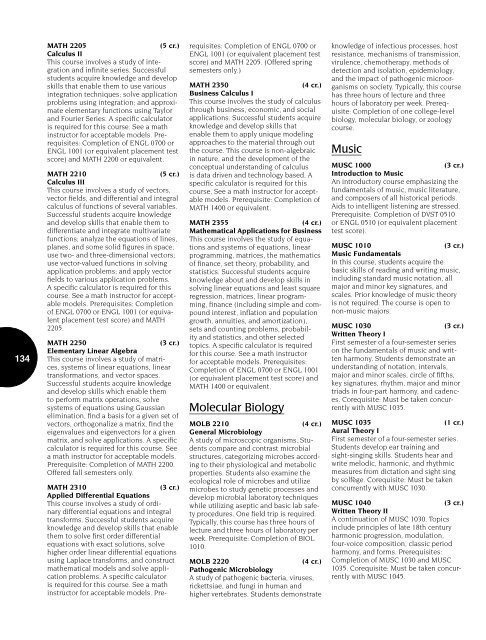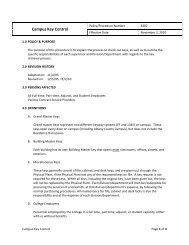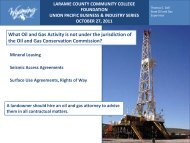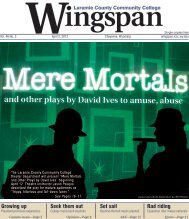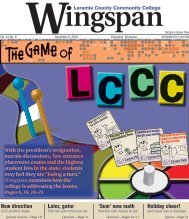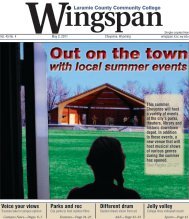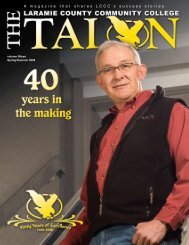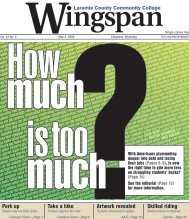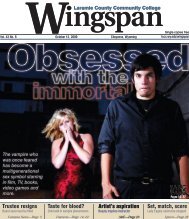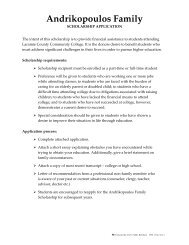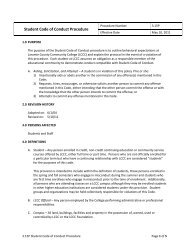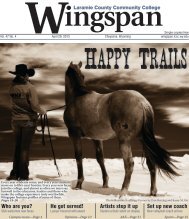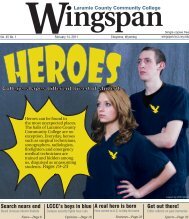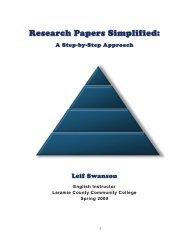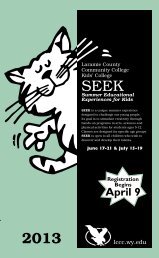LCCC policy - Laramie County Community College
LCCC policy - Laramie County Community College
LCCC policy - Laramie County Community College
Create successful ePaper yourself
Turn your PDF publications into a flip-book with our unique Google optimized e-Paper software.
134<br />
MATH 2205<br />
(5 cr.)<br />
Calculus II<br />
This course involves a study of integration<br />
and infinite series. Successful<br />
students acquire knowledge and develop<br />
skills that enable them to use various<br />
integration techniques; solve application<br />
problems using integration; and approximate<br />
elementary functions using Taylor<br />
and Fourier Series. A specific calculator<br />
is required for this course. See a math<br />
instructor for acceptable models. Prerequisites:<br />
Completion of ENGL 0700 or<br />
ENGL 1001 (or equivalent placement test<br />
score) and MATH 2200 or equivalent.<br />
MATH 2210<br />
(5 cr.)<br />
Calculus III<br />
This course involves a study of vectors,<br />
vector fields, and differential and integral<br />
calculus of functions of several variables.<br />
Successful students acquire knowledge<br />
and develop skills that enable them to<br />
differentiate and integrate multivariate<br />
functions; analyze the equations of lines,<br />
planes, and some solid figures in space;<br />
use two- and three-dimensional vectors;<br />
use vector-valued functions in solving<br />
application problems; and apply vector<br />
fields to various application problems.<br />
A specific calculator is required for this<br />
course. See a math instructor for acceptable<br />
models. Prerequisites: Completion<br />
of ENGL 0700 or ENGL 1001 (or equivalent<br />
placement test score) and MATH<br />
2205.<br />
MATH 2250<br />
(3 cr.)<br />
Elementary Linear Algebra<br />
This course involves a study of matrices,<br />
systems of linear equations, linear<br />
transformations, and vector spaces.<br />
Successful students acquire knowledge<br />
and develop skills which enable them<br />
to perform matrix operations, solve<br />
systems of equations using Gaussian<br />
elimination, find a basis for a given set of<br />
vectors, orthogonalize a matrix, find the<br />
eigenvalues and eigenvectors for a given<br />
matrix, and solve applications. A specific<br />
calculator is required for this course. See<br />
a math instructor for acceptable models.<br />
Prerequisite: Completion of MATH 2200.<br />
Offered fall semesters only.<br />
MATH 2310<br />
(3 cr.)<br />
Applied Differential Equations<br />
This course involves a study of ordinary<br />
differential equations and integral<br />
transforms. Successful students acquire<br />
knowledge and develop skills that enable<br />
them to solve first order differential<br />
equations with exact solutions, solve<br />
higher order linear differential equations<br />
using Laplace transforms, and construct<br />
mathematical models and solve application<br />
problems. A specific calculator<br />
is required for this course. See a math<br />
instructor for acceptable models. Prerequisites:<br />
Completion of ENGL 0700 or<br />
ENGL 1001 (or equivalent placement test<br />
score) and MATH 2205. (Offered spring<br />
semesters only.)<br />
MATH 2350<br />
(4 cr.)<br />
Business Calculus I<br />
This course involves the study of calculus<br />
through business, economic, and social<br />
applications. Successful students acquire<br />
knowledge and develop skills that<br />
enable them to apply unique modeling<br />
approaches to the material through out<br />
the course. This course is non-algebraic<br />
in nature, and the development of the<br />
conceptual understanding of calculus<br />
is data driven and technology based. A<br />
specific calculator is required for this<br />
course. See a math instructor for acceptable<br />
models. Prerequisite: Completion of<br />
MATH 1400 or equivalent.<br />
MATH 2355<br />
(4 cr.)<br />
Mathematical Applications for Business<br />
This course involves the study of equations<br />
and systems of equations, linear<br />
programming, matrices, the mathematics<br />
of finance, set theory, probability, and<br />
statistics. Successful students acquire<br />
knowledge about and develop skills in<br />
solving linear equations and least square<br />
regression, matrices, linear programming,<br />
finance (including simple and compound<br />
interest, inflation and population<br />
growth, annuities, and amortization),<br />
sets and counting problems, probability<br />
and statistics, and other selected<br />
topics. A specific calculator is required<br />
for this course. See a math instructor<br />
for acceptable models. Prerequisites:<br />
Completion of ENGL 0700 or ENGL 1001<br />
(or equivalent placement test score) and<br />
MATH 1400 or equivalent.<br />
Molecular Biology<br />
MOLB 2210<br />
(4 cr.)<br />
General Microbiology<br />
A study of microscopic organisms. Students<br />
compare and contrast microbial<br />
structures, categorizing microbes according<br />
to their physiological and metabolic<br />
properties. Students also examine the<br />
ecological role of microbes and utilize<br />
microbes to study genetic processes and<br />
develop microbial laboratory techniques<br />
while utilizing aseptic and basic lab safety<br />
procedures. One field trip is required.<br />
Typically, this course has three hours of<br />
lecture and three hours of laboratory per<br />
week. Prerequisite: Completion of BIOL<br />
1010.<br />
MOLB 2220<br />
(4 cr.)<br />
Pathogenic Microbiology<br />
A study of pathogenic bacteria, viruses,<br />
rickettsiae, and fungi in human and<br />
higher vertebrates. Students demonstrate<br />
knowledge of infectious processes, host<br />
resistance, mechanisms of transmission,<br />
virulence, chemotherapy, methods of<br />
detection and isolation, epidemiology,<br />
and the impact of pathogenic microorganisms<br />
on society. Typically, this course<br />
has three hours of lecture and three<br />
hours of laboratory per week. Prerequisite:<br />
Completion of one college-level<br />
biology, molecular biology, or zoology<br />
course.<br />
Music<br />
MUSC 1000<br />
(3 cr.)<br />
Introduction to Music<br />
An introductory course emphasizing the<br />
fundamentals of music, music literature,<br />
and composers of all historical periods.<br />
Aids to intelligent listening are stressed.<br />
Prerequisite: Completion of DVST 0510<br />
or ENGL 0510 (or equivalent placement<br />
test score).<br />
MUSC 1010<br />
(3 cr.)<br />
Music Fundamentals<br />
In this course, students acquire the<br />
basic skills of reading and writing music,<br />
including standard music notation, all<br />
major and minor key signatures, and<br />
scales. Prior knowledge of music theory<br />
is not required. The course is open to<br />
non-music majors.<br />
MUSC 1030<br />
(3 cr.)<br />
Written Theory I<br />
First semester of a four-semester series<br />
on the fundamentals of music and written<br />
harmony. Students demonstrate an<br />
understanding of notation, intervals,<br />
major and minor scales, circle of fifths,<br />
key signatures, rhythm, major and minor<br />
triads in four-part harmony, and cadences.<br />
Corequisite: Must be taken concurrently<br />
with MUSC 1035.<br />
MUSC 1035<br />
(1 cr.)<br />
Aural Theory I<br />
First semester of a four-semester series.<br />
Students develop ear training and<br />
sight-singing skills. Students hear and<br />
write melodic, harmonic, and rhythmic<br />
measures from dictation and sight sing<br />
by solfège. Corequisite: Must be taken<br />
concurrently with MUSC 1030.<br />
MUSC 1040<br />
(3 cr.)<br />
Written Theory II<br />
A continuation of MUSC 1030. Topics<br />
include principles of late 18th century<br />
harmonic progression, modulation,<br />
four-voice composition, classic period<br />
harmony, and forms. Prerequisites:<br />
Completion of MUSC 1030 and MUSC<br />
1035. Corequisite: Must be taken concurrently<br />
with MUSC 1045.


